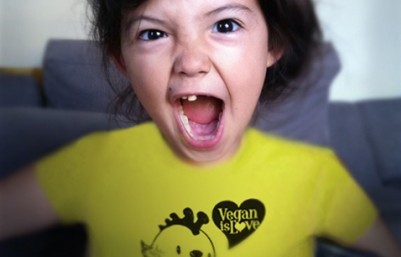Guest Blogger and Girlie Girl Army Boy Sgt, Ari Solomon writes a blog that every vegan alive will wish s/he had written;
Recently I’ve heard some perplexing criticisms of veganism. They go something like this: vegans are extremists, vegans are so preachy, veganism is like some fanatical religion, veganism is a cult. There obviously is some misunderstanding going on and I’d like to try and stamp out this issue once and for all. I realize I can’t possibly speak for all vegans, but this is how I see it:
First of all, veganism is clearly not some religion or cult. There is no Church of Vegan. Veganism is a philosophy. Donald Watson first coined the term “vegan” in 1944. This was how he defined it:
The word “veganism” denotes a philosophy and way of living which seeks to exclude – as far as is possible and practical – all forms of exploitation of, and cruelty to, animals for food, clothing or any other purpose; and by extension, promotes the development and use of animal-free alternatives for the benefit of humans, animals and the environment. In dietary terms it denotes the practice of dispensing with all products derived wholly or partly from animals.
Sounds pretty simple right? Well, nowadays people become vegan for all different reasons. They might go vegan because of health reasons, or perhaps they’ve read that animal agriculture is the number one cause of global warming. But, if someone is an ethical vegan, that means they’ve chosen to open their mind and heart to the suffering of animals. They want to alleviate unnecessary suffering where they can. (There are actually some people who feel that unless you go vegan for ethical reasons that you’re not really “vegan”, but that’s a whole other story.)

Here’s where things get interesting. While many of us may feel a certain attachment to the food we eat (cheese, anyone?), there is actually no human dietary requirement for animal foods. It’s true. You don’t need to eat meat, dairy or eggs to live.
In fact, Dr. Colin Campbell, who conducted the foremost study on human nutrition for over 40 years, detailed in his book “The China Study” how a vegan diet is actually better suited for optimal human health. This means that people eat animals not because they have to, but because they want to. Now, of course I’m not talking about people who live in countries where food is scarce and they’ll die unless they eat animal foods. I’m talking about you and me. People who shop at the supermarket where tofu, beans, rice, grains, fruits and vegetables are mere feet from meat, dairy and eggs. We have a choice.
In case you’re not up to speed, over 98% of all meat, dairy, and eggs produced in the US comes from factory farms. The conditions in these places are truly horrendous. Animals are crammed in spaces so tight they can’t turn around. They literally go insane, lying around all day and night in their own feces. They never see sunlight, have their beaks, horns and genitals cut off (without anesthetic) and are horribly abused by stressed and desensitized farm workers. We kill 10 billion animals for “food” a year in this country, that’s over 27 million animals a day. Most of those animals are birds, and all poultry (chickens, turkeys, ducks, and rabbits… yes, rabbits are considered poultry under the law) are excluded from the barely enforced Humane Slaughter Act.
Now, before you start at me with some “humane meat” “happy meat” bullshit please take note that ALL animals, whether they are raised in the nastiest of factory farms or grass-fed, free-range, blah blah blah, are all sent to the same slaughterhouses. That’s right, your organic steer is being sent to the same hell as a downer cow and will meet the same ghastly end. If you are a “humane meat” consumer, please take a moment and meditate on the whole concept of humane killing… bloody, fearful, struggling, screaming, despairing humane killing. It’s never pretty and it certainly isn’t “humane.”
There is a video making rounds on YouTube that shows a lone cow shaking in terror as she contemplates walking down the kill chute. She walks forward, then back. Animals can hear and smell the violence and death that awaits them. Their last moments are ones of abject horror and suffering. If you wouldn’t condemn your dog or cat to such a fate, how can you pay for others do it to these poor animals?
So. When a vegan is talking to a meat-eater about these issues, he or she is not “preaching”, “trying to convert”, or any such thing. We’re not telling you what to eat. We’re telling you what you’re eating.
Since animals can’t speak a language humans can understand (though I think the screams and terrified moans that fill slaughterhouses should be pretty much universal – all living beings want to live) it’s up to us to tell their stories and inform people of the suffering that goes on conveniently out of the public eye.
If, as a meat-eater, being exposed to this reality bothers you, it is not the fault of the vegan. Lashing out or making up endless excuses doesn’t change the stark scientific fact that animals are suffering because of our taste buds. Your neatly packaged chicken breast, all wrapped in pristine plastic, was once part of an animal that felt fear and pain. It’s called responsibility and culpability, and we’re all to blame.
Now, you may try to argue that eating animals is a matter of personal opinion or choice, but again I’d have to disagree — this is not about your opinion versus my opinion, this is about animal suffering. You can’t discuss your “personal choice” of eating animals while leaving animals completely out of the conversation.
Think of it this way, if you were walking down the street and saw someone beating their dog, would you try to do something to stop it? The same principle applies here. Since eating animal foods is a question of want and like versus need, killing a sentient being, when there is absolutely no need– except for someone’s pleasure– becomes simply unnecessary and merciless.
And if we say we care about cruelty to animals then it’s time we start caring about ALL animals. Yes, dogs and cats are companion animals but in terms of suffering our canine and feline friends feel the same as a pig, cow, chicken, lamb, or turkey. To pick and choose species in terms of whose pain we care about is incredibly hypocritical and inconsistent. Sorry, but if you’re eating veal parmigiana or turkey sandwiches, you don’t really care about animals. You may care about dogs and cats but you certainly don’t care about birds and baby cows.
So, who’s the real extremist? The person who tries to stop unnecessary suffering by cutting out animal products, or the person who says, I like the way that tastes so a sentient being needs suffer and die?
Who’s the real fundamentalist? The person who simply speaks the truth about where food comes from, or the person who knowingly chooses to ignore it, listening only to the falsehoods of the meat and dairy clergy? Isn’t the latter more akin to choosing to believe the earth is 5,000 years old despite clear evidence to the contrary?
The reality is that veganism couldn’t be more different from religion. While religion is based on faith, veganism is based on facts. Animal suffering is not some ethereal concept, it’s very real.
All animals deserve to be free from unnecessary pain, fear, and suffering at the hands of humans. How can anything less claim to be humane? Do I want more people to go vegan, is that why I talk and write about it? Of course, but it has nothing to do with me or some group that I belong to. It has to do with the animals who suffer everyday so that we can eat them, wear them, and do whatever we want to them simply because we can.
Veganism is the practical response to a social injustice. Instead of vegangelical, the word should be veganlogical.
Ari Solomon is the President and co-creator of the celebrated vegan candle line A Scent of Scandal . After graduating from NYU’s Tisch School of the Arts, Ari first worked as an actor in New York and Los Angeles, and later hosted the wildly popular ARI’S HOLLYWOOD UPDATE on Miami’s Y-100FM. Now a prolific activist and writer for animal and human rights, Ari’s letters have appeared in The New York Times, The Los Angeles Times, The Miami Herald, and The Advocate.




